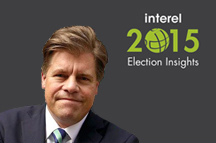Andrew Rawnsley, the Observer’s Chief Political Commentator, contributed a guest post for Interel’s 2015 Election Insights.
There are just over fifty days to go before the nation makes its decision - and during that time we will hear a lot of predictions about the result. Nearly all of it will be crystal balls. Anyone who tells you that they are confident of the outcome is a liar, a fool - or he is Dr Who and can time travel into the future. This is the tightest and least predictable battle for decades.
That makes it highly unusual. Most of our elections are not contests, they are coronations. Tony Blair in 1997. Margaret Thatcher in 1979. Harold Macmillian in 1959. And many other elections besides. The voters had essentially settled on who they were going to crown as prime minister a long time before they cast their ballots.

Some people expressed surprise at the result of our last general election. Yet the polls had been signalling for some time in advance that voters wanted Labour gone, but didn’t have enough confidence in the Tories to give them a majority. Which is precisely what happened.
Today the polls are also sending us a quite clear signal. They twitch this way and that, but within a very narrow band. Some days they give a slim advantage to Labour; others they give a slender lead to the Tories. But the big picture has been consistent for some time. The red tribe and the blue clan are stuck in a stalemate. The campaign so far has resembled the western front during World War One. There’s a lot of noise made by the crump of propaganda. A lot of churning - and hurling - of mud. Truth is often the first casualty of this political trench warfare. A decisive breakthrough eludes them both. It remains very hard to see a path for either of them to a parliamentary majority.
The next parliament is very likely to be hung because the electorate is split. Neither of the big parties - perhaps we should really say formerly big parties - has managed to assemble a broad coalition of voters behind them in the way Margaret Thatcher did for the Tories in the 1980s or Tony Blair did for Labour in more recent history. The old duopoly’s grip has been loosened by the rise of the insurgent parties: the Scottish nationalism of the SNP, the English nationalism of Ukip, and the anti-austerity appeal of the Greens. Their rise has been fuelled by a potent cocktail of hard economic times, disillusion and anger with a Westminster establishment which has still not recovered from the damage done by the expenses scandal, and the injection of issues of identity into politics.
 Voter revolt against the traditional parties of the government is to be found pretty much across the democratic world. If we look across western Europe, on average the combined vote share of the conventional parties of the centre-left and the centre-right has declined by an average of about 10 percent.
Voter revolt against the traditional parties of the government is to be found pretty much across the democratic world. If we look across western Europe, on average the combined vote share of the conventional parties of the centre-left and the centre-right has declined by an average of about 10 percent.
This trend has been compounded in Britain because neither of our traditional parties of government have managed to address and resolve their fundamental strategic weaknesses. Labour lags badly when voters are asked whether they regard it as party that can be trusted with the economy. In Ed Miliband, Labour also does badly on the “best prime minister question”. Normally, this would doom an opposition. Opposition parties have previously won power when they were behind on economic competence. And they have won with the less preferred leader. But no Opposition party has ever won in Britain when it has been behind on both.
Yet these Labour vulnerabilities are not translating into the surge for the Tories that Conservatives have expected. That is because the Tories have been equally poor at dealing with their fundamental strategic weaknesses. For them, it is widespread and deep voter distrust of Tory values and motives. They are still seen as the party of the rich and the privileged who govern only in the interests of the rich and the privileged. The Tories may hurt Labour with their deeply negative campaign strategy - and at the same time do damage to themselves. For it risks amplifying their reputation as - the phrase was originally coined by Theresa May - “the nasty party”.
When voters are asked about values, most express a preference for Labour values over Tory values. When voters are asked about leadership, more say they would choose David Cameron than would choose Ed Miliband. So in so much as we can tell what our divided country wants, its preferred result seems to be David Cameron as prime minister leading a Labour government. This is one outcome I confidently predict will not happen.












